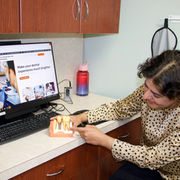How to Save a Damaged Tooth
- Jul 18, 2023
- 3 min read
Damaging a tooth can be stressful and cause varying degrees of pain and discomfort, ranging from mild sensitivity to severe toothaches. Damaged teeth can affect your smile and overall appearance. This can be particularly distressing if the damage is visible when you speak or smile. Many people emphasize dental aesthetics, and a damaged tooth may impact self-confidence and self-esteem. Teeth play a crucial role in chewing and speaking. When a tooth is damaged, it may hinder your ability to bite and chew properly, leading to difficulties eating certain foods. It can also affect your speech, causing impediments or changes in pronunciation.
Accidental injuries or trauma to the face, mouth, or jaw can result in tooth damage. This may include chipped, cracked, or fractured teeth. Damaged teeth are vulnerable to additional problems. For example, a cracked tooth can worsen over time, potentially leading to infection, tooth decay, or even tooth loss. Another cause of tooth damage is bruxism ((teeth grinding), which is characterized by grinding or clenching the teeth, often during sleep. Over time, bruxism can cause tooth wear, fractures, and other dental problems. Inadequate oral hygiene practices, such as infrequent brushing, flossing, and regular dental check-ups, can contribute to tooth damage. Neglecting oral health care can increase the risk of dental issues like cavities, gum disease, and tooth loss.

Saving a damaged tooth depends on the extent and nature of the damage. If you're experiencing tooth damage, it's essential to seek professional dental advice as soon as possible. In the meantime, here are some general guidelines to follow:
Rinse your mouth: Gently rinse your mouth with warm water to remove any debris or dirt surrounding the damaged tooth.
Control bleeding: If there is any bleeding, apply gentle pressure with clean gauze or a wet tea bag to help stop the bleeding. If bleeding persists or is severe, seek immediate dental care or visit an emergency room.
Preserve any tooth fragments: If your tooth has broken or chipped, try to locate any details. Rinse them with water, if necessary, and keep them moist. You can store the pieces in a small container with milk or saliva until you can see a dentist.
Manage pain and swelling: Over-the-counter pain relievers like acetaminophen or ibuprofen can help alleviate pain and reduce swelling. Follow the instructions on the packaging and consult a pharmacist if you have any concerns or medical conditions.
Apply a cold compress: If there is swelling or facial pain, applying a cold compress to the affected area can help reduce inflammation. Use a cloth-covered ice pack or a bag of frozen vegetables wrapped in a thin cloth. Apply it to the outside of your cheek for about 15 minutes, with breaks in between.
Avoid aggravating the tooth: Be cautious when eating or biting down on the damaged tooth. Stick to soft foods and avoid chewing on the affected side of your mouth.
Seek professional dental care: It is crucial to make an appointment with a dentist as soon as possible. They will evaluate the damage and recommend appropriate treatment options based on the severity. Treatment options may include dental bonding, crowns, root canal therapy, or tooth extraction, depending on the extent of the damage.
Only a dentist can properly diagnose and recommend the best action to save a damaged tooth. Regular dental check-ups, good oral hygiene practices, and preventive measures can significantly reduce the risk of tooth damage.
For more information about dental health, please call one of our offices or contact us online.














Comments